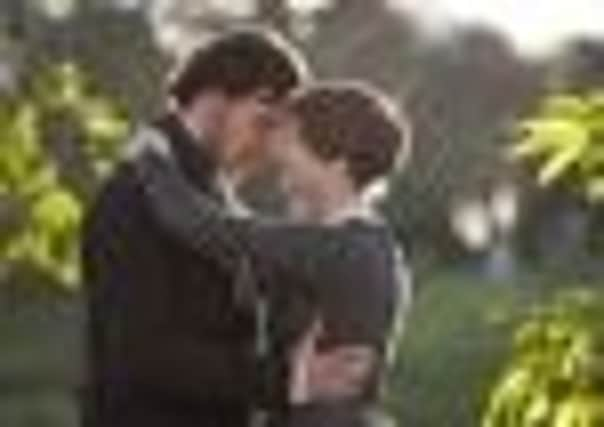Eyre affair continues


It’s dangerous ground, visualising Charlotte Bronte’s gothic romance: there’s a lot of ground-breaking feminism, scandal and appropriately wild weather to fit into 90 minutes.
But the attempts to bring Bronte’s words to life continues, and of the numerous attempts by directors to do so, Cary Fukunaga has the spirit of the novel spot on.
Advertisement
Hide AdAdvertisement
Hide AdThe pickiest of critics will point out that the casting of plain Jane is at cross-purposes with the unusual looking 21-year-old Australian actress, Mia Wasikowska – she is after all, supposed to be, “obscure, plain, and little”.
The same can be said for the brooding Michael Fassbender as Edward Fairfax Rochester, who has hardly been dealt a bad hand in the looks department, yet must reciprocates with remarks like, “you’re not pretty anymore than I am handsome,” words that ring true to the novel but not to the actors playing the characters.
But that small matter aside – lest we forget, this is Hollywood – the pair are well cast.
Fassbender stews with unabashed arrogance as Rochester, putting small-town Jane on the spot with blunt questions such as “do you find me handsome?”
Advertisement
Hide AdAdvertisement
Hide AdWasikowska’s reserved portrayal means she responds to the Rochester’s intensity with a restraint natural to her station.
She responds with firm put-downs matched with a steely gaze, a trait Wasikowska masters with understated delivery.
Their exchange is quick witted and fiery, propelled by Fassbender’s urgent delivery and the only criticism is that he perhaps overplays this aspect of the gothic anti-hero to the point of carnal: more Heathcliff than Rochester.
Jane is a role that ticks the boxes for early feminism: she’s a working class governess but she’s not fool.
Advertisement
Hide AdAdvertisement
Hide AdBest of all Wasikowska plays with a much more passable northern accent than Anne Hathaway’s recent and diabolical attempts.
Her measured guttural lilt compliment Fukanga’s attention to the Brontean love of the wild and untamed moors and dales as a backdrop to disastrous tales of woe.
Pathetic fallacy is gloriously abused with widescreen panning shots of bruise-coloured bracken being bashed by high winds, misty grey mornings reflecting the turmoil of relationships doomed by class and expectation, and bare tree branches clawing at gloomy skies.
The film teeters on becoming glamorised, partly because the tempestuous descriptions of the text lends itself to exaggeration, but Fukunaga does well to keep it from becoming just another tea-time period drama.
The characters are earthy and fiercely acted by both stars – it’s not a startling rework but it’s a classy and polished effort.